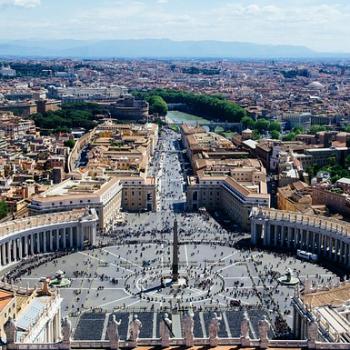
Tax collectors and sinners were all drawing near to listen to Jesus,
but the Pharisees and scribes began to complain, saying,
“This man welcomes sinners and eats with them.”
So to them Jesus addressed this parable:
“A man had two sons, and the younger son said to his father,
‘Father give me the share of your estate that should come to me.’
So the father divided the property between them.
After a few days, the younger son collected all his belongings
and set off to a distant country
where he squandered his inheritance on a life of dissipation.
When he had freely spent everything,
a severe famine struck that country,
and he found himself in dire need.
So he hired himself out to one of the local citizens
who sent him to his farm to tend the swine.
And he longed to eat his fill of the pods on which the swine fed,
but nobody gave him any.
Coming to his senses he thought,
‘How many of my father’s hired workers
have more than enough food to eat,
but here am I, dying from hunger.
I shall get up and go to my father and I shall say to him,
“Father, I have sinned against heaven and against you.
I no longer deserve to be called your son;
treat me as you would treat one of your hired workers.”’
So he got up and went back to his father.
While he was still a long way off,
his father caught sight of him, and was filled with compassion.
He ran to his son, embraced him and kissed him.
His son said to him,
‘Father, I have sinned against heaven and against you;
I no longer deserve to be called your son.’
But his father ordered his servants,
‘Quickly bring the finest robe and put it on him;
put a ring on his finger and sandals on his feet.
Take the fattened calf and slaughter it.
Then let us celebrate with a feast,
because this son of mine was dead, and has come to life again;
he was lost, and has been found.’
Then the celebration began.
Now the older son had been out in the field
and, on his way back, as he neared the house,
he heard the sound of music and dancing.
He called one of the servants and asked what this might mean.
The servant said to him,
‘Your brother has returned
and your father has slaughtered the fattened calf
because he has him back safe and sound.’
He became angry,
and when he refused to enter the house,
his father came out and pleaded with him.
He said to his father in reply,
‘Look, all these years I served you
and not once did I disobey your orders;
yet you never gave me even a young goat to feast on with my friends.
But when your son returns
who swallowed up your property with prostitutes,
for him you slaughter the fattened calf.’
He said to him,
‘My son, you are here with me always;
everything I have is yours.
But now we must celebrate and rejoice,
because your brother was dead and has come to life again;
he was lost and has been found.'”
A Father had two sons, and the younger son said to his father: “give me my share of the estate.”
There was no reason to ask for a share of the estate. The son lived right there with the father, and all the father had was his, but that wasn’t enough. He didn’t want to enjoy the estate. He wanted to own it in his own name. He asked, and the father gave it to him: he signed over half the property. Now the son had half of what he’d had before.
After that, the son didn’t have to leave. His father didn’t tell him to leave; and indeed, for a few days, he stayed around. Then he left. He abandoned the place where everything the father had was his, and went to a distant country where nobody knew him and nobody loved him. There, he squandered everything and made a fool of himself.
He found himself homeless, starving, humiliated, helpless. But he didn’t go back to his father. He decided to become somebody’s servant, and they put him to work feeding the swine. As he worked, he longed to eat some of the garbage that was meant for the pigs, but nobody would let him. That’s how stingy they were. And that’s when the younger son came to his senses.
The son wasn’t sorry for what he did, mind you; he just came to his senses.
He didn’t feel bad that he’d demanded sole ownership of half the father’s property and taken it away. He was just hungry, and wanted to go back to where the food was. The father had lots of food. The son was still demanding to think of everything in terms of ownership and dollars and cents. That was why he settled on the plan of offering himself as a servant. And he set out for home, rehearsing his speech.
While he was still a long way off, the father saw him coming, and ran to him.
How is that possible?
How is it that the father saw the son from a long way off?
Was the father watching for him? Was he following him?
Could it be that the younger son didn’t realize just how vast this generous father’s property was? Could it somehow be that, no matter how far we go, we are still on the estate, and the Father is nearby all along?
“I no longer deserve to be called your son,” said the son, but the father didn’t care. The father didn’t understand words like “deserve.” The father brought the son into the party with the fattened calf, with music and dancing and all the wonderful things he’d missed.
Then the older son arrived, and was angry, and left.
The father went out to plead with him, but the older son complained that the father was stingy. “You never gave me even a young goat to feast on with my friends.”
Again, the Father didn’t seem to understand. “You are here with me always. Everything I have is yours.”
Why didn’t the older son feast? How could it be that the father never gave him a goat? How can a father this generous have never given his son a goat?
Could it be that he never asked for a goat?
Could it be that he was so busy doing exactly as he thought that he ought, that he never bothered to ask his father for anything?
Could it be that the father was so open and bountiful with his sons, that he assumed the son would go ahead and take the goat, or the fattened calf, or anything else he wanted, since everything the father had was already his?
Could it be that we all live in the midst of such a treasury of blessings, and everything the Father has is ours, but we’ve forgotten to ask for a blessing? Or could it be that the Father is constantly giving us blessings, but we are so busy trying to follow rules and be good that we forget to open our mouths and eat?
Could it be that we have been tearing apart the Father’s beautiful household, because we demand to own it like property instead of dwelling here like children?
Is the Kingdom of the Father a treasure that slips right out of your hands as soon as you demand to own it and bear it away to a distant country? Is it a place you return to the minute you come to your senses– not even feel sorry, but come to your senses, and ask for something to eat?
Maybe the older son went into the party.
Maybe he didn’t. Maybe he took his half of the estate, and went off to a distant country where nobody knew him and nobody loved him, until he came to his senses.
Maybe, if we come to our senses, we will find that the Father is already here.
Mary Pezzulo is the author of Meditations on the Way of the Cross, The Sorrows and Joys of Mary, and Stumbling into Grace: How We Meet God in Tiny Works of Mercy.













